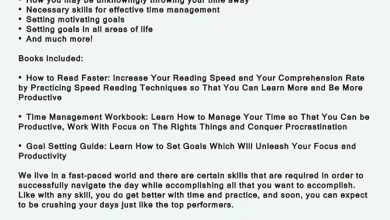Why Is Time Management Important For Productivity?

Time is a precious and limited resource that we all share equally. However, our time use can differ significantly, affecting our productivity and overall success.
Effective time management skills can significantly impact our ability to achieve our goals and be productive in our personal and professional lives. Now you may be thinking: Why is time management important for productivity?
Time management is important for productivity because it allows individuals to efficiently allocate their time to achieve their goals while reducing stress levels, making better decisions, and balancing work and personal life.
In this blog, we will explore the importance of time management for productivity, its benefits, and practical tips to help you manage your time effectively.
Relationship Between Time Management And Productivity
Effective time management can significantly improve productivity. Proper time management skills help people focus on essential tasks, reduce distractions, and allocate time appropriately.
Individuals gain greater control over their time and stress levels by creating lists, prioritizing tasks, and breaking down projects into manageable steps. Effective time management leads to a better work-life balance, improved decision-making, and healthier relationships.
In contrast, poor time management can result in missed deadlines, low productivity, and increased stress. Therefore, learning and implementing time management strategies can benefit personal and professional life by achieving goals and finding balance.
How Does Time Management Affect Productivity?
Effective time management is crucial to productivity, both in professional and personal lives. Proper time management skills can help individuals prioritize tasks, minimize distractions, and stay on track toward achieving their goals.
People can maintain balance and control over their activities by creating lists, setting task timeframes, and taking breaks between tasks. Poor time management, on the other hand, can lead to stress, missed deadlines, and reduced productivity levels.
Effective time management can help reduce stress levels and improve relationships by creating more time for personal and professional life, ultimately leading to a better quality of life.
Why Is Time Management Important For Productivity?
Effective time management is a critical skill that can significantly impact a person’s productivity, stress levels, decision-making, work-life balance, and achievement of goals. Here, we will discuss why time management is essential for productivity and its benefits.
Improved Productivity
Effective time management enables people to prioritize and allocate their time to essential tasks. By doing so, they can complete their work on time and less stress, resulting in increased productivity. Proper time management ensures that people can focus on the most critical tasks, which leads to higher-quality work and a greater sense of accomplishment.
Reduced Stress Levels
Poor time management leads to stress, anxiety, and burnout. When people struggle to manage their time effectively, they may feel overwhelmed and stressed, which can negatively affect their work performance and personal lives. With proper time management, individuals can plan their day and break their work into manageable tasks, leading to a more organized and less stressful workday.
Better Decision-Making
Time management also helps people make better decisions. People who are stressed or have too much to do may make hasty or poor decisions. With effective time management, individuals can allocate enough time to decision-making, leading to better and more informed choices.
Enhanced Work-Life Balance
Effective time management skills can help individuals balance their work and personal lives. When people prioritize their tasks, they can manage their workload efficiently and have more time to spend with family and friends. Additionally, they can pursue hobbies and activities they enjoy, leading to a healthier work-life balance.
Achievement of Goals
Proper time management can help people achieve their goals. When individuals plan their tasks and set realistic deadlines, they can work towards achieving their objectives systematically. People can make steady progress toward achieving their goals by prioritizing tasks and breaking them down into manageable steps.
Minimizing Distractions
Time management helps individuals minimize distractions, allowing them to focus on their work. People can stay on track and avoid interruptions by allocating specific times for emails, phone calls, and other activities. They can also avoid multitasking, which can be detrimental to productivity and quality of work.
Strategies For Effective Time Management For Better Productivity
Effective time management is a vital skill for achieving personal and professional goals. Poor time management can lead to missed deadlines, increased stress, and decreased productivity. Here are five strategies for effective time management to improve productivity:
Setting Priorities
The first step towards effective time management is prioritizing tasks based on their importance and urgency. Start by creating a to-do list of all the tasks that need to be accomplished.
Then, divide the tasks into four categories: critical tasks, high-priority tasks, essential tasks, and unimportant tasks. Focus on completing the critical and high-priority tasks first, followed by crucial tasks. Unimportant tasks can be delegated or scheduled for later.
Creating a Schedule
Creating a schedule is crucial for managing time effectively. It helps allocate specific times for different tasks, ensuring they are completed on time. An excellent way to create a schedule is to break down the day into smaller time frames, such as hourly or half-hourly blocks. Block out time for essential tasks and prioritize them before scheduling other activities.
Using Tools to Manage Time
There are several tools available to help manage time effectively. One such tool is a time-tracking app that helps to monitor how much time is spent on different tasks.
This can help identify areas where time is wasted and adjust the schedule accordingly. Other tools such as calendars, reminders, and to-do lists can also help to manage time effectively.
Delegating Tasks
Delegating tasks is an effective way to manage time and increase productivity. Identify tasks that can be delegated to other people, such as team members or employees.
Delegation can free up time to focus on more critical tasks or projects. It can also help to develop the skills of team members, leading to increased productivity and better relationships.
Avoiding Distractions
Distractions can be a significant time waster, leading to decreased productivity and increased stress levels. To avoid distractions, turn off notifications from social media and email.
Set aside specific times to check and respond to emails and messages. Also, consider working in a quiet place, such as a library or a private office, to minimize distractions.
Overcoming Common Obstacles To Effective Time Management
Several obstacles may hinder the ability to manage time efficiently. Here we’ll discusses some common barriers to effective time management and how to overcome them.
Procrastination
Procrastination is a significant barrier to effective time management. It can be tempting to postpone essential tasks or activities, leading to stress and poor performance. To overcome procrastination, break down tasks into smaller, actionable steps, and set deadlines to hold yourself accountable.
Lack of Motivation
Lack of motivation can make it challenging to focus on tasks, leading to time wastage. Set clear goals and identify the benefits of completing tasks to overcome this. Break tasks into smaller, achievable goals, and reward yourself upon completion.
Poor Planning
Poor planning can lead to disorganization and confusion, resulting in missed deadlines or incomplete tasks. To overcome this, create a to-do list, prioritize tasks, and allocate time frames for each task. Regularly review your progress to identify and address any gaps.
Overcommitment
Overcommitment can lead to burnout and decreased productivity. To overcome this, learn to say no to tasks that do not align with your priorities. Prioritize essential tasks and delegate or outsource non-essential ones.
Multitasking
Multitasking can seem efficient but can result in a decline in productivity. To overcome this, focus on one task at a time, eliminate distractions, and take breaks between tasks to refresh your mind.
Final Thoughts
From now on, you will know: “Why is time management important for productivity?” after reading the discussion above. Typically, time management is an essential factor in increasing productivity as it allows for more efficient and effective use of resources.
It prioritizes tasks and creates a schedule that helps ensure that all tasks are completed on time. Time management also reduces stress levels and allows for more time for leisure activities. Furthermore, it can also increase motivation and focus as tasks are completed promptly.



